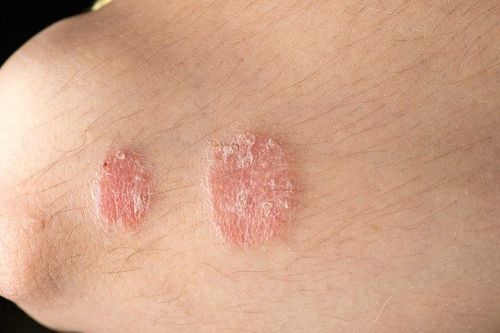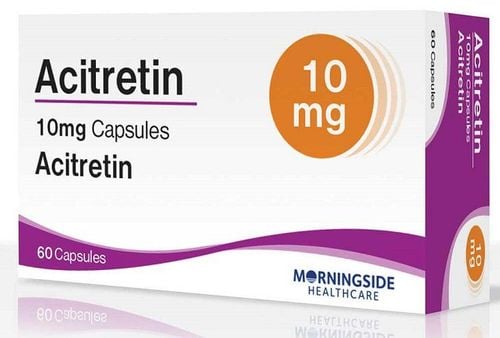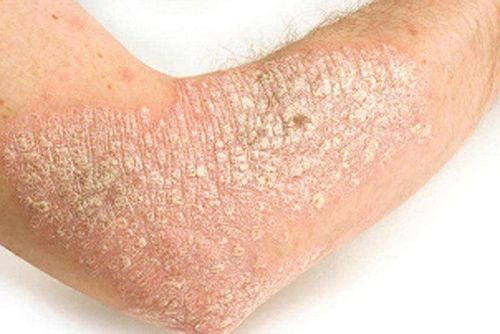This is an automatically translated article.
Psoriasis is a common autoimmune disease that causes insulin resistance and increased insulin production increasing the risk of developing diabetes.
1. Mechanism of psoriasis
Psoriasis is a dermatological disease, the mechanism of which is autoimmune. Currently, drugs can only treat the symptoms of the disease, not cure it completely. Therefore, treatment tends to continue throughout the patient's life.
In people with psoriasis, skin cells are replaced too quickly. Usually, it takes 3 weeks to 4 weeks for cells to grow in the deeper layers of the skin. As the skin matures, they slowly rise to the surface. However, psoriasis causes immature skin cells to reach the surface in less than a week, after which they die and slough off. This leads to red, itchy patches of skin.
2. Psoriasis treatment for people with diabetes
2.1 Lifestyle changes 2.1.1 Reduce stress Anxiety not only aggravates the skin but also increases blood sugar. You can try deep breathing exercises, meditation, or regular exercise to manage stress.
Giảm căng thẳng giúp duy trì ổn định lượng đường trong máu
2.1.2 Eat healthy Certain foods like fruits, vegetables, and whole grains can help control diabetes and psoriasis. Limit your intake of sugar and alcohol, as this will make the symptoms of psoriasis and diabetes worse.
For a more scientific diet, you can consult a nutritionist.
2.1.3 Weight control Obesity is a risk factor for type 2 diabetes and psoriasis. Obesity can lead to an increase in inflammation, because fat cells secrete inflammatory cytokines. Therefore, monitoring your weight regularly and maintaining it at a reasonable level helps the body respond better to psoriasis treatments.
At the same time, it also makes your blood sugar easier to control. In addition to your primary care physician. You should see a dermatologist for skin care and an endocrinologist to help you manage your diabetes. If you have psoriatic arthritis, see a rheumatologist.
Also, learn about the medications you're taking about their side effects and how long to take them. Any questions you have, you should ask your doctor. Thus, the treatment process will be more effective.

Kiểm soát cân nặng là một trong những biện pháp hạn chế tiểu đường và tình trạng viêm
2.2. Certain type 2 diabetes medications According to a recent review, some people with psoriasis took a type of medication called a glucagon-like peptide (GLP-1, Glucagon-like Peptide) receptor agonist. for diabetes and was surprised when it worked for psoriasis.
The researchers explain: A peptide or amino acid sequence that increases insulin secretion, and a GLP-1 agonist that helps trigger this process.
GLP-1 agonists may help regulate the immune system by reducing systemic inflammation. Previous studies have shown that GLP-1 agonists inhibit tumor necrosis factor-alpha (TNF-alpha). TNF-alpha is a cytokine or protein involved in psoriatic inflammation. Many biologic treatments for psoriasis, such as Enbrel (etanercept) and Humira (adalimumab) work by blocking TNF-alpha.
However, some psoriasis medications can raise blood sugar and make diabetes harder to control.
2.3 Certain Other Medicines The drug etanercept can trigger hypoglycemia (very low blood sugar). Another popular psoriasis medication, methotrexate, can cause serious liver damage in people with diabetes. If your doctor prescribes it, you'll need blood tests in a few months. Any questions that need to be answered by a specialist doctor as well as if you have a need for examination and treatment at Vinmec International General Hospital, please book an appointment on the website for the best service.
Please dial HOTLINE for more information or register for an appointment HERE. Download MyVinmec app to make appointments faster and to manage your bookings easily.
Articles refer to sources: webmd.com, medicalnewstoday.comMORE:
Genetic factors in atopic dermatitis Notes with plaque psoriasis Psoriasis treatment options













